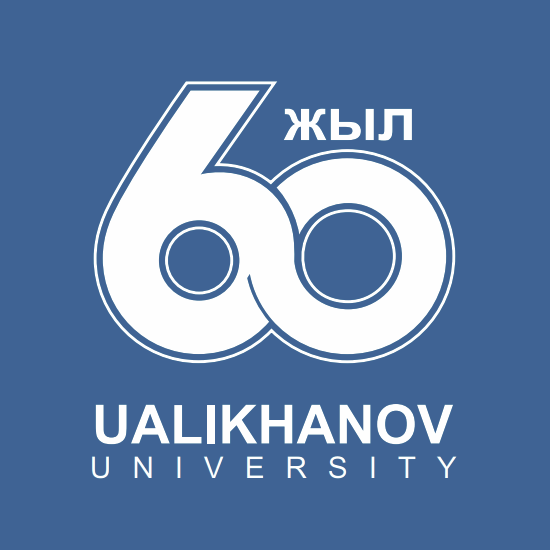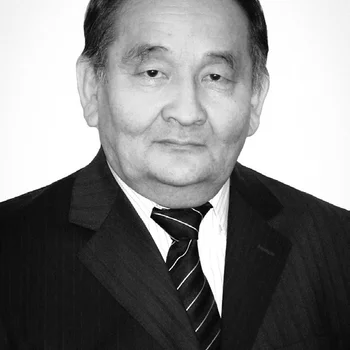

Tursynbek Sabyrovich Malikov (1946-2018) is an unusual scientist - researcher, and even more so an extraordinary person. The personality of the professor, doctor of pedagogical sciences, academician of the International Academy of Informatization, intellectual, thinker is so multifaceted that it does not fit into the rigid framework of a biographical narrative. Suffice it to mention that in 2010, an avid mathematician, unexpectedly for many eminent newspapermen, became the owner of the prestigious “Altyn Kalam” award, “Golden Pen”, having won the nomination of the regional creative journalist competition held annually by the Department of Internal Policy. Always and in everything, Tursynbek Malikov defended his bright originality, remaining a free person in not entirely free times. A man of enormous charm and wit, the professor greatly valued the litmus test of intelligence in people—humor; he knew how to inventively and unobtrusively notice the essence of any phenomenon and joke without viciousness but cheerfully. With persistence and even courage, he mastered science and strove to achieve the truth in his philosophical essays, which, by the way, were published in the reputable academic journal “Mysl”. It is precisely such bright independent personalities that we sometimes fear during their lifetime, and after leaving, as if having come to their senses, we call them prophets. The truth he uttered sounded indisputable in his mouth, and, moreover, greatly embarrassed ill-wishers and envious people, of whom there are plenty in the scientific community at all times: “Truth laughs when one should cry, driving a coward and a scoundrel into a stupor.” Tursynbek-aga, with whom our families did not interrupt warm family relations almost all our lives, from childhood I did not at all imagine him as a skinny intellectual, poring over manuscripts and monographs day and night; in the children’s imagination, he was clearly different from many typical luminaries of science in the textbook sense . A cheerful, hospitable owner of his home, he greeted his relatives invariably warmly, affably, and a quiet joy always shone in his eyes. The most delicious intellectual “treat” during our always welcome meetings were long, very useful conversations and instructive conversations with Tursynbek-aga. Professor Malikov had a courageous, memorable, impressive appearance - often laughing, he recalled funny cases of how he was often mistaken for a minister in Astana and Almaty - a tall, stately, prominent man, in whose entire appearance one could feel an impressive, physically felt strength. I remember at the presentation of my first book, “My City for You,” in 2005, supporting on behalf of my older brothers, Tursynbek-aga complained from the podium with hidden bitterness: “Are there really so few medals and orders for teachers in the bins of our homeland...” . And all his life the son of a famous in the Kazakh SSR
Honored Teacher Sabyr Malikov, after whose name a street in his homeland in Kyzylta is named, tried to support teachers, argued in his analytical articles on the pages of local and central media, and with his sharp, biting style revealed the “ulcers” of school education, offering original solutions. Tursynbek Sabyrovich masterfully wielded the pen, sometimes merciless, sometimes ironic, but always fair and truthful. This bright man put into practice the testament of the great Shalva Amonashvili, “I correct the wrong with love, I heal with kindness,” boldly and openly, like no one else could console, warm, and calm. For from childhood I was brought up in an atmosphere of the cult of teaching, amazingly warm human relations. Anyone who has experienced poverty and hunger is unlikely to want his children and relatives to experience hardship. In the family of Sabyr Malikov, during the difficult post-war period, called by historians “the time of unfulfilled hopes,” they welcomed the orphans and the poor, orphans, stumbled fellow villagers and visiting travelers, unselfishly helped in any way they could, gave not only shelter and shelter, but also supported them without abandoning them who needs, accompanying through life. Moreover, in the hospitable family of Sabyr Malikov it was not customary to allow even a shadow of discontent, or to hear cold words addressed to those who need help. The burnt-out steppe and the yellow autumn hills of Sary-Arka the color of old honey, the hills filled with a bright glow of greenery in the spring, the painted silks of summer colors became the first picture of his soul. With full right, Malikov can be called an artist, for he thought
in artistic images. Unhurried eagles soar in the blurred sky, their leisurely circular flights in the form of spirals and that huge undivided space that accommodated the fullness of youthful perception, forever embedded in the worldview of the future scientist. That is why we believe: a person’s soul is shaped by the landscapes of childhood, those that he first saw with the vision of his heart. The soul cannot change in the future. The soul can only expand and be replenished with other pictures of the world. The gifted young man graduated from school with a gold medal, easily entered Tomsk State University, but due to temporary health problems, he received his higher education and a diploma in the specialty “Mathematics Teacher” at the Omsk Pedagogical Institute. In 1986, he completed his postgraduate studies at the Moscow State Pedagogical Institute named after Lenin, where he defended his Ph.D. thesis. After 9 years - a doctoral dissertation on methods of teaching mathematics at the Institute of Content and Methods of Teaching of the Russian Academy of Education. Tursynbek Sabyrovich Malikov is a truly humane person, and the multi-layered word “tolerance” perfectly suits the description of his person. Possessing wide erudition and a unique range of thinking, informed in almost every sphere of social life, in conversation, in dialogue, Malikov invariably listened to the opinions of others, did not know how to suppress the greatness of his mind and intellect, but, on the contrary, showed respect for a different position in every possible way. He had no selective memory, he did not distance himself from people according to rank, the status quo. And, probably, his distinctive quality was kindness, an organic need to help others in trouble, without waiting for a request or a knock on the door. Indeed, he devoted all his strength and health to work. He wrote extensively and fruitfully, edited scientific literature on methods of teaching mathematics, supervised applicants for scientific degrees, over ten master's and doctoral dissertations were defended under his supervision. Having worked as a senior teacher, he headed the department of geometry and teaching methods (then this department became known as the department of mathematics and teaching methods) , later headed the department of pedagogy and headed the department of private methods of natural and mathematical disciplines. Three solid scientific monographs, four textbooks on mathematics, philosophy and didactics of mathematics and over a hundred scientific methodological works in the treasury of the scientist-researcher Malikov, of which two dozen were published abroad, in the UK and Germany. The scientist’s practical, useful methodological articles were previously published in all-Union and later in Russian scientific and practical journals “Mathematics at School”, “Kvant”, “Pedagogy”, “Standards and Monitoring in Education”. Malikov was the first to study the problems of the relationship between intuition and logic in teaching mathematics and identified a number of patterns in the didactic functioning of reasoning methods. In the context of his research in the 1980s, Professor Malikov put forward valuable suggestions and recommendations on methods for writing mathematics textbooks, and boldly decided to make constructive comments regarding the textbooks of recognized
luminaries of Russian science A.N. Kolmogorov and A.V. Pogorelova. After his retirement, the professor continued to remain at the university as an academic professor in the university’s department of mathematics, and colleagues, master’s students, and doctoral students often turned to him for advice, receiving qualified, competent answers. The scientist has many high awards and titles: Certificate of Honor from the Ministry of Public Education of the KazSSR, the titles “Excellence in Education of the Republic of Kazakhstan”, “Honored Worker of Education of the Republic of Kazakhstan”. The scientist’s destiny also included international recognition: Tursynbek Sabyrovich is the winner of the international competition “Best Scientific Theses of 2015” in the “Best Scientific Work” category. It was significant for a highly creatively restless person to remain a socially active person: Tursynbek Sabyrovich Malikov was elected a judge of the Arbitration Court of the Republic of Kazakhstan, an arbitrator of the International Arbitration Court "Independent Arbitration Center". This bright man, in the most literal sense of the worn-out, hackneyed, and sometimes inappropriately used word “patriot,” was a real citizen who seriously deserved this title. He honestly earned the respect of his fellow Kyzyltus people, the workers of the blessed promised land. It is not without reason that during the last years of his life, Tursynbek Malikov, who wrote about intuition in teaching mathematics, and also a member of the Union of Journalists of Kazakhstan, Doctor of Pedagogical Sciences, created essays with his light pictorial pen about outstanding people of his small homeland, having managed during his lifetime to publish the collection “Unknown Kyzyltu, which included soulful essay about Koishibai Akhetov, Sabyr Malikov, Saken Zhunusov, Serik Tokpanov, Kazbek Askarov, Olzhabai Baigozhin and other worthy sons of the fatherland. Questioning Professor Malikov’s students and undergraduates, I was more than once convinced of how sincerely and touchingly they loved him. “Tursynbek Sabyrovich is an excellent expert in his subject, a talented mentor, one of the most beloved teachers, fair and principled, he never scolded us for the mistakes we made, much less scolded us publicly, he would ask in more detail and laugh, and we ourselves understood where we had missed the mark. calculations. None of us dared to miss his lectures; we knew that so many new things were so interesting and exciting that few could present them in classes on methods of teaching mathematics. How easy this multifaceted, amazing personality was to communicate with us, the students. And after a while, at every opportunity, we turned to our Teacher for practical and everyday advice and received so much warmth,” Sandugash Kakenova and Galina Moskvina, 1986 graduates of the Physics and Mathematics Department of the Valikhanov KPI, fondly recall. Colleagues Saule Damekova, Rashit Musaibekov, Aina Khamitova, and the late Temirkhan Zharkinbekov saw Professor Malikov as a support in their joint creative work and could always count on his real support and tangible help. Tursynbek Sabyrovich, by character and attitude to life, was the greatest optimist, an extremely positive person, who saw light and hope in all surrounding phenomena and suddenly occurring events. No wonder he was especially close and for many years friends with Mars Galievich Subkhankulov, an eccentric genius of psychology, a famous practical scientist, vice-president of the Association of Psychologists of Kazakhstan. “Death is always merciless, and at full gallop a black horse dies on white snow,” - in the fall of 2018, our dear Tursynbek Sabyrovich Malikov passed away from us. But as if the light of a distant star continues to radiate to us through time and partings the good name and good deeds of a person who loved life so much. “Rockets have flown more than once to the distant stars, into the heavenly mist, people, people, distant stars, I wish I could only reach you...”